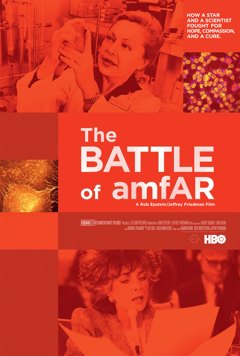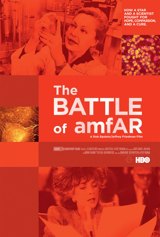In the darkest days of the AIDS pandemic, two very different women – Hollywood superstar Elizabeth Taylor and research scientist Dr. Mathilde Krim – joined forces to create amfAR (American Foundation for AIDS Research), America’s first AIDS research foundation. The fight against HIV/AIDS would never be the same again. In 1981, research scientist Dr. Mathilde Krim learned of unusual cancer cases, all of which involved gay men, that were showing up in the medical practice of a friend. A politically and socially active New Yorker, she was eager to learn all she could about the disease, and when people began to die, the potential magnitude of the problem became a concern. In response, Dr. Krim and a few colleagues committed their own money to gaining a better understanding of the disease.
AIDS research found an unlikely ally in Hollywood icon Elizabeth Taylor, who was devastated by the loss of her good friend, actor Rock Hudson, to the disease. When Dr. Krim called Taylor to see if she would be interested in getting involved with the cause, the actress agreed immediately, and amfAR, the first national organization to mobilize the scientific community in the fight against AIDS, was born. As they started speaking out about the disease and the need for research, Krim recalled that Taylor “was terrific. She was moving. The public responded to her.”
While Dr. Krim focused on energizing the scientific community through her professional, political and social connections, Elizabeth Taylor worked alongside activist groups and supported groundbreaking legislation such as The Ryan White CARE Act, leveraging her celebrity to bring media attention to HIV/AIDS. Taylor delivered emotional testimony before Congress, declaring, “No one is safe…It is not just a minority disease. It belongs to all of us. I ask here and now for the national leadership that is necessary to fully appropriate this bill. Because I will continue to come and ask for it again, and again…And I will not be silenced, and I will not give up, and I will not be ignored.” She pressured President Reagan to acknowledge the existence of HIV/AIDS as a worldwide pandemic and convinced him to speak at an amfAR fundraiser.
Both women were leaders, sharing an activist spirit. “Dr. Krim was very impatient about what she saw as red tape, and Elizabeth was too, and I think that’s what they had in common, that activist spirit,” notes Taylor’s former publicist, Sally Morrison, who was an early amfAR employee.
By the mid-’90s, AIDS was the leading cause of death for Americans age 25 to 44. In 1996, research partially funded by amfAR led to lifesaving new drugs that made HIV/AIDS treatable, a diagnosis that no longer guaranteed a death sentence. Facing the prospect of patients requiring lifelong therapy to survive, however, amfAR continued its diligent search for a cure.
Original Release
01/18/2013
US Release
01/18/2013
Cast









